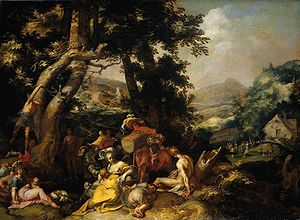- Matthew 3:9
-
 Abraham Bloemaert's Landscape with the Ministry of John the Baptist, c. 1600
Abraham Bloemaert's Landscape with the Ministry of John the Baptist, c. 1600
Matthew 3:9 is the ninth verse of the third chapter of the Gospel of Matthew in the New Testament. The verse occurs in where John the Baptist is berating the Pharisees and Sadducees. He has previously called them a brood of vipers and warned them of the wrath to come and has urged them to repent. In this verse he warns that their links to Abraham will not save them
In the King James Version of the Bible the text reads:
- And think not to say within yourselves,
- We have Abraham to our father: for I
- say unto you, that God is able of these
- stones to raise up children unto Abraham.
The World English Bible translates the passage as:
- Don't think to yourselves, ‘We have
- Abraham for our father,’ for I tell
- you that God is able to raise up
- children to Abraham from these stones.
For a collection of other versions see BibRef Matthew 3:9
France does not believe that John the Baptist was attacking them for their reliance on bloodlines, rather he sees the phrase "Abraham for our father" as a reference to the exalted position within the political and religious hierarchy that the Pharisees and Sadducees felt would guarantee their salvation. This links with the overall theme of John's preaching that true repentance is the only path to salvation. Jesus uses the same reference to attack hypocrites in Matthew 8:11-12.[1]
A second interpretation is that John is rejecting the then popular notion of "merits of the fathers" or Zekhut Avot. This principle was that because of the righteousness of Abraham and the other patriarchs, all Jews were now the chosen people and could count on goodwill from God. John is saying that no such lineage would save them from judgement. The reference to creating new children of Abraham out of stone is an illustration of God's omnipotence and that he has no need for his current worshipers.[2][3]
The "raising up of children to Abraham from these stones" is generally seen as wordplay as in Hebrew the word for stones is abanim and children is banin. France also believes the line is a reference to Isaiah 51:1-2 which calls Abraham "the rock from which you were hewn."[4]
References
- ^ France, R.T. The Gospel According to Matthew: an Introduction and Commentary. Leicester: Inter-Varsity, 1985.
- ^ Harrington, Daniel J. The Gospel of Matthew. Liturgical Press, 1991 pg. 56
- ^ Schnackenburg, Rudolf. The Gospel of Matthew. Wm. B. Eerdmans Publishing, 2002 pg. 32
- ^ France, R.T. The Gospel According to Matthew: an Introduction and Commentary. Leicester: Inter-Varsity, 1985.
Gospel of Matthew Preceded by:
Matthew 3:8Chapter 3 Followed by:
Matthew 3:10Categories:- Gospel of Matthew verses
- John the Baptist
Wikimedia Foundation. 2010.
